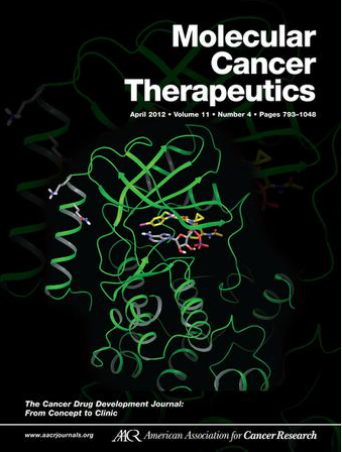Abstract IA005: Therapeutic vulnerabilities of cohesin-mutant myeloid malignancies
IF 5.3
2区 医学
Q1 ONCOLOGY
引用次数: 0
Abstract
Splicing modulation is a promising treatment strategy pursued to date only in splicing-factor mutant cancers; however, its therapeutic potential is poorly understood outside of this context. Like splicing factors, genes encoding components of the cohesin complex are frequently mutated in myeloid malignancies, including 15-20% of myelodysplastic syndromes (MDS) and secondary acute myeloid leukemia (AML), where they are associated with poor outcomes. I will discuss our recent findings identifying cohesin mutations as biomarkers of sensitivity to drugs targeting splicing-factor SF3B1 (H3B-8800 and E-7107) and describe the mechanism by which drug-induced alterations in splicing of DNA repair genes, such as BRCA1 and BRCA2, underlie this sensitivity. We have demonstrated that treatment of cohesin-mutant cells with SF3B1 modulators results in impaired DNA damage response, accumulation of DNA damage, and increased sensitivity to PARP inhibitors and a panel of chemotherapeutic agents in vitro and in vivo, using AML cell lines and patient-derived xenograft models. Furthermore, we identified RAD51 foci formation as a predictive biomarker of sensitivity to SF3B1 splicing modulation alone or followed by sequential treatment with PARP inhibition and chemotherapy, and have identified additional non-cohesin mutant subtypes of MDS/AML and ovarian and breast cancer which are sensitive to this therapeutic approach. Our findings expand the potential therapeutic benefits of SF3B1 splicing modulators to include cohesin-mutant MDS/AML and we propose this as broader strategy for therapeutic targeting of other DNA damage-repair deficient cancers. Citation Format: Zuzana Tothova. Therapeutic vulnerabilities of cohesin-mutant myeloid malignancies [abstract]. In: Proceedings of the AACR Special Conference in Cancer Research: Expanding and Translating Cancer Synthetic Vulnerabilities; 2024 Jun 10-13; Montreal, Quebec, Canada. Philadelphia (PA): AACR; Mol Cancer Ther 2024;23(6 Suppl):Abstract nr IA005.摘要 IA005:粘合素突变型髓系恶性肿瘤的治疗弱点
剪接调节是一种很有前景的治疗策略,迄今为止只在剪接因子突变的癌症中使用;然而,在这种情况之外,人们对其治疗潜力还知之甚少。与剪接因子一样,编码凝聚素复合物成分的基因也经常在髓系恶性肿瘤中发生突变,包括15-20%的骨髓增生异常综合征(MDS)和继发性急性髓系白血病(AML),它们与不良预后有关。我将讨论我们最近的研究发现,凝聚素突变是靶向剪接因子 SF3B1(H3B-8800 和 E-7107)的药物敏感性的生物标志物,并描述药物诱导的 DNA 修复基因(如 BRCA1 和 BRCA2)剪接改变是这种敏感性的基础机制。我们利用急性髓细胞性白血病细胞系和患者衍生的异种移植模型证明,用 SF3B1 调节剂处理凝聚素突变细胞会导致 DNA 损伤反应受损、DNA 损伤积累以及对 PARP 抑制剂和一系列化疗药物的体外和体内敏感性增加。此外,我们还发现 RAD51 病灶的形成是对单独使用 SF3B1 剪接调节或随后使用 PARP 抑制剂和化疗进行连续治疗的敏感性的预测性生物标志物,并发现了对这种治疗方法敏感的其他非内聚酶突变亚型 MDS/AML、卵巢癌和乳腺癌。我们的研究结果扩大了 SF3B1 剪接调节剂的潜在治疗效果,将粘连蛋白突变的 MDS/AML 包括在内,并建议将其作为针对其他 DNA 损伤修复缺陷癌症的更广泛的治疗策略。引用格式:Zuzana Tothova.粘合素突变型髓系恶性肿瘤的治疗弱点[摘要]。In:AACR 癌症研究特别会议论文集:癌症合成脆弱性的扩展与转化》,2024 年 6 月 10-13 日,加拿大魁北克省蒙特利尔。费城(宾夕法尼亚州):AACR; Mol Cancer Ther 2024;23(6 Suppl):Abstract nr IA005.
本文章由计算机程序翻译,如有差异,请以英文原文为准。
求助全文
约1分钟内获得全文
求助全文
来源期刊
CiteScore
11.20
自引率
1.80%
发文量
331
审稿时长
3 months
期刊介绍:
Molecular Cancer Therapeutics will focus on basic research that has implications for cancer therapeutics in the following areas: Experimental Cancer Therapeutics, Identification of Molecular Targets, Targets for Chemoprevention, New Models, Cancer Chemistry and Drug Discovery, Molecular and Cellular Pharmacology, Molecular Classification of Tumors, and Bioinformatics and Computational Molecular Biology. The journal provides a publication forum for these emerging disciplines that is focused specifically on cancer research. Papers are stringently reviewed and only those that report results of novel, timely, and significant research and meet high standards of scientific merit will be accepted for publication.

 求助内容:
求助内容: 应助结果提醒方式:
应助结果提醒方式:


